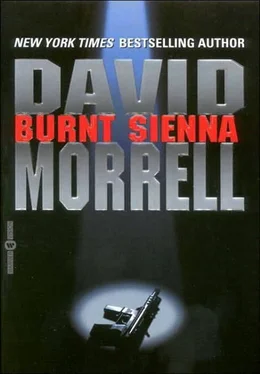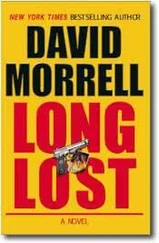“Nobody knows I’m one of Chase’s biggest collectors,” Braddock said. “One of the reasons I’m successful is, I don’t let people know my business.”
“Then you’ll do it?” Malone asked.
Braddock thought about it. “With a condition.”
“Name it.”
“One of the works has to be of…” Braddock looked at Sienna. “I assume your real name isn’t Beatrice.”
“No.” She sounded apologetic.
“I’d like one of the paintings to be of you.”
“Don’t worry.” Malone smiled. “In a way, she is Beatrice. From now on, I’ll be doing a lot of paintings of her.”
“Thank you.” Sienna kissed Braddock’s cheek.
It was ten the next morning. The sky was bright. The breeze smelled fresh. Malone, Sienna, and Braddock stood on the front porch.
He rubbed his skin where she’d kissed him, then blushed. “Shoot, that’s almost fair-enough payment for what I gave you.”
Malone held the money in a brown suitcase that Braddock had supplied. Ten thousand one-hundred-dollar bills took up less room than Malone had expected – and weighed less: only about twenty pounds. To fill out the suitcase, Braddock had added some denim shirts and jeans in Malone’s size. Sienna’s suitcase contained similar basic articles of clothing.
“As soon as we settle somewhere, I’ll get to work,” Malone said. “In a month or two, you’ll start receiving paintings.”
“No rush. Whenever inspiration strikes.”
“I’ve got plenty of that.” Malone smiled at Sienna. “By the way, Clint, wherever I ship the paintings from won’t be where we’re staying.”
“I figured. I’m also figurin’ I won’t see you for a while.”
Malone shrugged.
“Maybe a long while.”
Malone looked away.
“Be careful, my friend,” Braddock said.
“Believe me, I’m going to try.”
A silent moment lengthened.
“I guess we’d better get moving,” Malone finally said. His mouth was dry from emotion. He shook hands with Braddock – firmly.
As he and Sienna got into the car, his chest ached with the regret of severing this connection. It’s a good thing I don’t have close family, he thought. I’d need to sever those connections, too.
Then he realized he was wrong – he did have close family. He studied Sienna as she got into the car, wishing he had the time to sketch how she looked this morning. It wasn’t just that the white blouse Braddock had found for her brought out the quality of her skin and the luster in her hair. It was something deeper, something that he knew he would never stop wanting to draw.
The car was an eight-year-old Ford Explorer that Braddock had bought from one of his ranch hands for more money than the man had ever seen at one time in his life. It had a dented front fender and spewed foul black smoke, but it would get them where they needed to go.
The wallet Malone had taken from the dead man contained ID for Dale Perry. In Abilene, Malone used it to get a Texas driver’s license in Perry’s name. He registered the Explorer in Perry’s name.
They headed west.
Yuma, Arizona. Malone had been there twelve years earlier on a military training exercise at the Marine Corps Air Station on the edge of town. During the summer, the city was small, about fifty thousand people, but during the winter, the population doubled, the area’s sunny climate and the Colorado River attracting snowbirds from the north, most of whom stayed in trailer parks. At the end of March, the city was still booming.
Malone and Sienna rented a self-storage unit and stuffed it with old tables and bureaus, the furniture in such poor condition that anyone who broke in would curse and go on to other targets. In back was an old chest, in which Malone hid the suitcase containing the million dollars.
He locked the pull-down metal door, gave Sienna one key, and pocketed the other. With the twenty thousand dollars they kept, they went to various banks, avoiding attention by never exchanging more than two thousand at any one place. Where they were going, twenty thousand in pesos would last them quite a while.
They loaded up on things they might need, then headed south, reaching the Mexican border in forty minutes. The crossing was at a city called San Luis, where the Mexican guards barely looked at the Explorer. It was the same casual attitude Malone recalled from when he had crossed the border years earlier while on leave from military exercises in Yuma. Normally, visitors driving a vehicle into Mexico needed a tourist card and a temporary vehicle import permit, but Malone’s destination was part of an area called the Sonoran Free Trade Zone, and such documents weren’t necessary. The length of visits was unrestricted. Even if these guards had decided to stop and search the Explorer, Malone wouldn’t have cared. He had nothing incriminating. The handgun he had taken from Dale Perry’s body was down a sewer in Yuma.
The city gave way to small farms. Then the farms became sporadic until there was only sand and tufts of grass.
“Smell it?” Malone asked.
“What?”
The Gulf of California separated mainland Mexico from its western peninsula, Baja California. In his youth, Malone had been surprised to learn how close the Pacific Ocean was to southern Arizona – less than two hours away – and had never forgotten driving down to it.
“The moist air. The salt smell. We ought to have a glimpse of the sea over the next rise.”
Instead, they faced a military roadblock.
Sienna tensed.
“Take it easy,” Malone said. “They’re looking for drugs smuggled in by boat. They’re interested in vehicles coming from the sea, not toward it.”
Each side of the barricade had three armed soldiers. On the opposite side of the road, a battered pickup truck was being searched. The officer in charge, a mustached, lean-faced captain, watched from behind mirrored sunglasses.
Sienna wore sunglasses also. A droopy straw hat. No makeup. She’d done everything practical to conceal her features without being conspicuous about it. Nonetheless, Malone worried that the guards would sense how attractive she was and want to take a look. His worry turned out to be groundless. The soldiers were so interested in what was going on with the pickup truck that they waved him on.
Looking in the rearview mirror, Malone saw the captain watching the Explorer drive away.
“There,” he told Sienna. “No problem.”
“I see it!” Sienna pointed to the right, where a distant sheet of blue glinted from reflected sunlight.
The road paralleled the water, gradually narrowing the space between. In a couple of miles, buildings appeared, then palm trees, the outskirts of a town. Malone drove past a convenience store and a car-repair shop. A sand-colored two-story house had a red-tiled roof. The house beside it was made from cinder blocks. Next came a refuse-littered lot, and after that, a shack. That was the pattern: expensive houses next to poor ones in a seaside community that didn’t have the pretensions of a beach resort. Farther into town, the pavement ended, the wide road turning to sand. On the right was an open square with benches underneath shade trees, flanked by a police station and a small grocery store. On the left, past a chain-link fence, was a row of one-room school buildings, each well maintained, the grounds immaculate, as were the children playing at recess.
“This is Santa Clara,” Malone said. “It’s a fishing village that got discovered by Americans with motor homes who were looking for a place to take cheap vacations. So many Americans come and go down here, we won’t look out of place. In fact, as long as we stay to ourselves and contribute to the local economy, we’ll be welcome.”
Читать дальше












